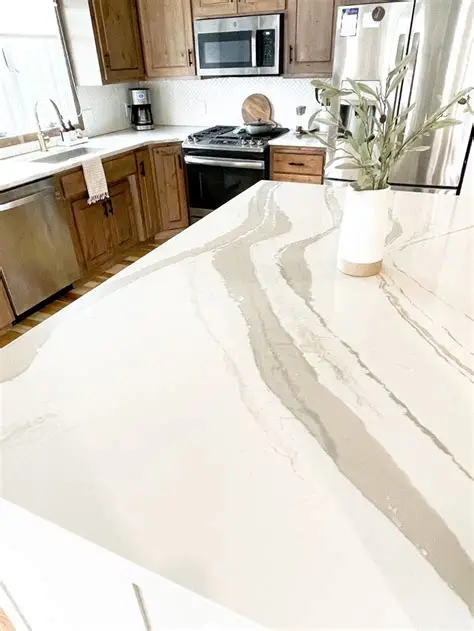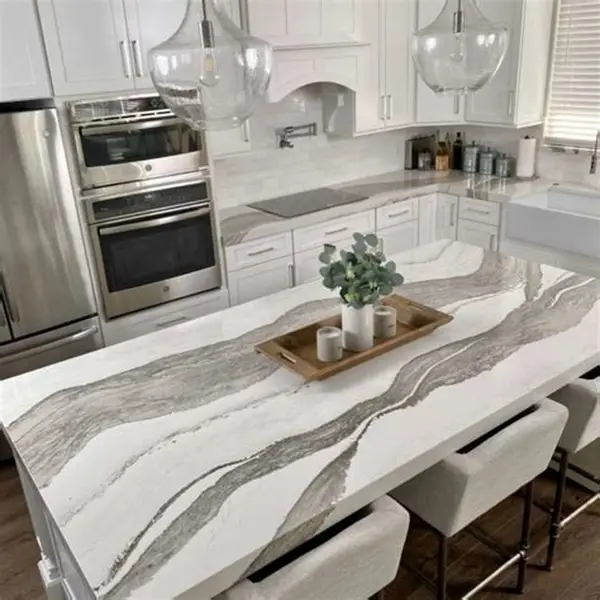Quartz countertops have become one of the most popular choices for homeowners, designers, and renovators looking for a blend of elegance, durability, and low maintenance. Found in both modern kitchens and sleek bathroom designs, these surfaces have redefined the look and functionality of interior countertops.
But despite their popularity, many still ask: What are quartz countertops made of? Are they natural? Are they safe? How are they different from granite? Let’s dive deep into the materials, manufacturing process, and benefits behind this trending surface.
👉 Related: What Are Quartz Countertops?

The Core Composition of Quartz Countertops
Unlike purely natural stone surfaces, quartz countertops fall under the category of engineered stone countertops. These surfaces are not cut directly from stone blocks but are instead man-made using a mix of natural quartz crystals, binding resins, and added pigments.
Main Ingredients in Quartz Countertops:
- Natural Quartz (90–95%): One of Earth’s hardest minerals, quartz gives the countertop its strength and resilience.
- Polyester Resins (5–10%): These act as a binder to hold the quartz together, also making the surface non-porous.
- Pigments and Dyes: Added to create a wide range of colors and patterns—like white quartz countertops, grey quartz countertops, or even black quartz countertops.
- Optional Additives: Some slabs include mirror chips, glass shards, or metal flecks to enhance shine or mimic marble look quartz countertops.
This engineered approach enables greater color consistency, shape flexibility, and surface customization—offering homeowners options from veined quartz countertops to clean, minimalist finishes.

How Quartz Countertops Are Manufactured
While the composition tells us what goes in, it’s the manufacturing process that brings these ingredients together into a strong, beautiful slab.
👉 Learn more: How Are Quartz Countertops Made?
Step-by-Step Breakdown:
- Quartz is mined and crushed into fine particles.
- The particles are mixed with resin and pigments.
- The mix is poured into slab molds.
- Using vacuum vibrocompression, air is removed, and the mixture is compacted.
- The slab is baked (cured) at high temperatures to harden it.
- After cooling, the slab is polished using diamond polishing pads.
- Quality control checks are performed before shipment.
💡 Pro Tip: Handling large quartz slabs requires proper lifting gear—use Material-handling Equipment for safe installation.
Why Quartz Countertops Are So Popular
1. Durability
Quartz is stronger than many natural stones, making it a top pick for high-traffic kitchens and busy family bathrooms. It resists chips, cracks, and scratches better than most other options.
2. Low Maintenance
Thanks to its non-porous surface, quartz doesn’t require sealing like granite. It resists stains from coffee, wine, oil, and other everyday spills.
👉 Learn: How to Seal Granite Countertops? to see the difference in care.
3. Style Versatility
Whether you want Calacatta quartz countertops with natural marble veining or budget quartz countertops in solid colors, the engineered nature allows nearly endless customization.
Quartz Countertops vs. Granite Countertops
A common question in the remodeling world is: Is quartz better than granite?
| Feature | Quartz Countertops | Granite Countertops |
|---|---|---|
| Composition | Engineered (90–95% quartz + resin) | 100% natural stone |
| Porosity | Non-porous | Porous (needs sealing) |
| Design Variety | Wide range, uniform | Natural, unique per slab |
| Maintenance | Very low | Requires sealing |
| Durability | High | High but brittle |
| Heat Resistance | Moderate | Higher than quartz |
👉 Explore the full Quartz vs. Granite Cost Comparison
Best Uses for Quartz Countertops
Quartz countertops can be used in almost any indoor surface application:
- Quartz kitchen countertops: From modern farmhouse to sleek minimalism, quartz can match any theme.
- Quartz bathroom countertops: Resistant to moisture and mold, perfect for vanities.
- Commercial countertops: Ideal for cafes, office pantries, and hotels due to their durability.
You’ll often find:
- Affordable white quartz countertops for modern kitchens
- Low maintenance quartz countertops for busy families
- Best types of quartz countertops for bathroom vanities
Are Quartz Countertops Worth It?
Absolutely. While quartz may have a higher initial countertop installation cost, the long-term savings on maintenance, durability, and aesthetic longevity make it a worthwhile investment.
If you’re concerned about pricing, there are options like:
- Budget quartz countertops
- Quartz countertop showrooms with promotional pricing
- Quartz countertops near me listings that offer local discounts
Where to Buy Quartz Countertops
You can find quartz slabs and installation services at:
- Quartz countertops in [city/region] via Google Maps or Yelp
- Custom quartz countertop installers
- Local quartz countertop suppliers
- Showroom displays for different finishes and edge profiles
For those considering DIY options, research DIY quartz countertop installation tips carefully—these slabs are heavy, and installation mistakes can be costly.
How to Clean Quartz Countertops
Even though quartz is stain-resistant, regular care is important. Avoid abrasive cleaners, bleach, or vinegar.
Daily care tips:
- Use mild dish soap and a soft cloth.
- Wipe spills immediately.
- Avoid placing hot pans directly on the surface.
👉 Related: How to Clean Quartz Countertops
Final Thoughts
Quartz countertops are crafted through a meticulous blend of natural quartz, resins, and pigments—resulting in a non-porous, durable, and visually stunning surface. Their engineered design allows for unmatched color variety, consistent appearance, and resilience.
Whether you’re designing a contemporary kitchen, renovating a luxury bathroom, or seeking a countertop that balances form and function, quartz offers one of the best returns on investment.
Explore your options, ask questions at showrooms, and consult local installers to discover the perfect quartz countertop for your space.
👉 Don’t forget to check:
Quartz vs. Granite Cost Comparison?
How Are Quartz Countertops Made?

